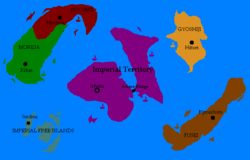Chuushima
| Expert | Daein | ||
| |||

| |||
| Capital | |||
| Largest city | |||
| Government Title
|
| ||
| Settlement |
|||
| Official Language(s) | |||
| Official Religion | |||
| Currency | |||
Contents
General Information
Chuushima is a group of islands situated to the southeast of the continent of Igala. This continent is mostly inhabited by humans, but there is a huge variety of creatures that inhabit this small continent. Most of the non humans are found within the county of Morida, but they can be found anywhere.
Society
Due to the lack of contact during the beginning years of Chuushima's history, it has formed an original society, different from most others. The same concept of ruling remains, however, as you can find the emperor, princes, nobles, and all such titles. The people are usually very friendly towards each other, but wary of outsiders, until they are used to them. Most live a very simple life, but opportunities to rise are available in Chuushima, and it is not the first time that someone has risen from a lowly position to a high and important member in the society, albeit rarely as important as those who are born in the aristocratic class.
Political Information
The political system is technically a limited monarchy. An emperor rises to power with the traditional heir method, and is backed in his decisions by a council. Said emperor is ideally meant to have his own lands under his personal control, as well as indirectly control the remaining lands through his vassals, situated all over Chuushima. The only exceptions to this rule are Gyoshiji, where the prince of the country rules until he reaches the age to become king. In the absence of an heir, this county is directly controlled by the king. While some people argue that being under the control of an inexperienced prince is an insult, others claim that it is a good idea, as the prince will be less prone to become money minded or otherwise corrupted by the power that he holds, and the Imperial Free Islands, situated to the southwest of the Imperial Lands, which, while keeping constant trade relationships, and having a very similar lifestyle to that of the empire's, keeps its own autonomy. However, this rule is not really followed. Even though they're under the same king, tensions are rising between the Morida and the Douseki. The Morida claim that non humans should be able to participate in the Chuushiman council, while the Douseki say that only humans should be allowed to. The Fuseiyakou clan, on the other hand, just seems to be becoming more autonomous as time goes by. Therefore, while Chuushima is technically one country, reality is much more different.
Basic History
Chuushima is a country that has risen comparatively recently, and has nowhere near the age and history of certain lands like Doma. Chuushima takes its name from the old leader who started the growth of the empire. Originally nomads, the Chuushima clan settled near the sea, and started their settlement in a very mineral rich area. They slowly started expanding, finding no competition to their comparatively advanced civilization. Basically, the Chuushima clan found a very easy rise to power within their own island. A historical treasure from this period is the Arame Bridge (Marked on map), connecting the two islands of the Imperial Land. Basically, the Chuushima clan, led by father and son, successfully took over most of the land. The sea became one of the major strengths of the clan, as they started trading and traveling to the nearby islands, and even farther, as far as Igala. However, the Chuushiman clan could not hold all of the lands under direct control as it grew larger. Therefore, it trusted the leaders of the most prominent clans to act as their vassals within the region. Trade flourished during this period, and it is during this time that the language was created. Trade was carried out largely with the Nekonian nekojin. The old language itself was extremely little-used, and most spoke only Common. However, due to the trade carried out with Nekonia, a language began to form. Over the ages, the old language, which resembled Nekonian as well, was not spoken much, and the new official language became a dialect which came from this language, which explains how come most of the cities got their names.
Recent Status
Like so many great empires, slowly the Chuushiman empire's strength started to wane. Now, even though it remains in power, it lacks the strength to expand anymore, especially with the relations with the vassals. However, even so, it still remains a great point for sea trade, as the now far more advanced ships help trade with Igala, Prandia, Argovia and a lot of different locations. Therefore, while the empire is not as strong as it once were, it is still far from dying. Apart from sea trade, one of the major noticeable things about Chuushima is its architecture. Palaces, temples, etc. are made with exquisite (Oriental) design, and even on the inside, one might admire the great design and art of the buildings.
Imperial Free Islands
While rather close to the main empire, the imperial free islands are, as the name implies, not under the control of the main empire. The reason is that the inhabitants of these islands were also advanced, and, when faced by the Chuushiman empire, under threat of a Chuushiman invasion, fortified the islands heavily, and held their land until a truce was made between the two countries. These islands, however, always were very strong religiously, and now serve as island sanctuaries, where religious people following the many gods can go to pray. One of the many important temples lying in these islands is the high temple of Istaria, the goddess of balance.
Miscellaneous
Native Animals
Orns
Orns are a herd animal in Chuushima. However, it is not easy to have a herd of Orns, despite their being mostly native to Chuushima. This is because Orns are prone to be extremely stubborn, until tamed. That is why most Orn herders have had a long heritage of that, or have spent quite some time to get one.
Orns are mostly stubborn due to their body. While they have a shape similar to a pig's, they are covered by a thick shell, and have a very hard tail which they are known to hit pursuers with while fleeing. However, they have a great taste, and having an Orn dish by a good Chuushiman cook is considered to be food fit for kings.
Badora
These are, unlike the Orn, mostly a wild species. These are a mixture between a snake and a dragon, usually no longer than a foot, or two at most for the longer species. However, their real strength lies in their stomach muscles, as strong as most of the powerful non-poisonous snakes, and their teeth and jaws, which allow this creature to bite extremely painfully. Their wings do not allow for much flight, therefore, they are usually used by the badora to hide in trees and glide onto their prey.
These badora are, like dragons, prone to have different elements. Therefore, there may be fire badora found in volcanoes, or water badora living next to (or even in) streams and rivers. However, the normal, non-elemental badora can be found wherever reptiles are most likely to live.The Istari
In most Chuushiman legends regarding the rise of the Empire, and even in some historical records, it is said that ever since the first King of the Chuushiman legacy, on the right hand of said ruler, was a powerful psychic. Said psychic would divine the future, give advice to the king, be useful in most diplomatic efforts... And even be a dangerous foe on the battlefield.
Today, much more is known than just this. Istari were found in most armies ever since the rise of the empire, where available. It is a wierd, mostly unexplainable fact that Istari were only found within those of Chuushiman or part Chuushiman descent. Due to their history, most Istari are pretty high up on the social ladder. But like most inherited traits, Istari can be found by mutation, or by other causes, in the wierdest of places. This is not a good thing, however, as most Istari who do not learn how to control their psychic powers from an early age end up going insane and killing themselves by frying their own brain.
Taking care of such a wild power, as one needs to remember, is like trying to hold a group of horses running in separate directions. Therefore, Istari usually have to spend a long time to manage their own power, or risk the above happening to them.
As for the social impacts... Istari are usually loved by the higher ups, because of their history and usefulness as far as political work is involved, but, especially by the lower-class people, that isn't always the case. One has to remember the feeling that an inherited power gives to others lacking it...
The Samurai Order
It was no mistake when "Samurai ORDER" was written above. That is because the Samurai as we know them do not exist in Chuushima, but they exist in a different way. They are members of a Knight Order, one which is its own organization, even if backed by the Chuushiman Emperor.
The aims of the Samurai, however, are no different from the ones we know, apart from the fact that only the leaders of the Samurai order have political power because of their position in the Order. While it is true that most Samurai are of noble descent, it is not part of the teachings of the Samurai to work upon them.
However, the Samurai still learn the same code of honour, with two differences. Firstly, breaking a rule is not the end of the world. While it is looked down upon, a person is given a redemption period before the punishment. Redemption period is based on the rule broken. The second, is that seppuku is something which is done only in the most extreme of cases, where there is no hope of redemption. Some young Samurai, in fact, consider people who believe in it as being old-fashioned and crazy.
Samurai teachings vary from one place to the other, though they are the same in beliefs. The variation is mostly in their dress code (if any, for Morida lacks it), and the style of combat they teach. There are few schools where one can learn this, and they are all extremely expensive. Being one is a great priviledge and honour.
-- Elementalist Daien
